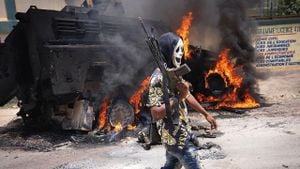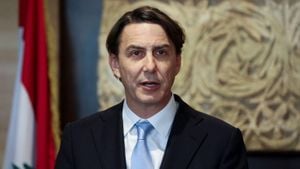With COP29 fast approaching, global leaders are gathering to address one of the most pressing issues of our time: climate finance. This year's conference, hosted in Baku, Azerbaijan, is especially significant as nations rally around the urgent need for financial commitments to tackle climate change. Developed countries, particularly those with high emissions, are under increasing pressure to fulfill their promises to assist developing nations, which are disproportionately affected by environmental crises.
The Group of 20 (G20) leaders recently convened, underscoring the gravity of this challenge. At their meeting, they recognized the need to boost climate finance from billions to trillions of dollars. The leaders articulated their commitment to scaling up financial resources for sustainable development, particularly for poorer nations grappling with the devastating effects of climate change. Yet, activists expressed disappointment over vague commitments lacking specificity and clarity.
A major focus for COP29 is establishing the new collective quantified goal on climate finance, known as NCQG. Developing countries, supported by civil society groups, argue for raising the previous funding goal from $100 billion annually to $1.3 trillion by 2035. This stark increase highlights the urgent need for enhanced financial support to adapt and transition to cleaner energy sources.
India, one of the prominent nations at COP29, is pushing for reforms and seeking to receive more funding as it faces considerable climate vulnerabilities. The pressure on India and other countries like China and those within the Middle East to contribute to the new financing goals continues to intensify. Some nations view this as necessary to uphold global climate objectives, arguing against the idea of 'donor fatigue' among historically wealthy nations.
At the conference, faith groups and activists demonstrated against the backdrop of stalled negotiations, advocating for accountability from high-emitting nations. They stress the moral obligation of wealthier countries to address the inequities stemming from climate change. Voices from the grassroots level, including Lydia Lehlogonolo Machaka from CIDSE, resonate with the urgency for developed nations to step up and fulfill their climate commitments.
The political climate at COP29 is charged, with varying interests and agendas at play. Emerging market countries are particularly vocal about the necessity for substantive financial commitments. This sentiment is echoed by various environmental organizations and faith-based groups, who insist on the ethical imperative of wealthy nations stepping up their contributions to climate finance.
Delegates are also focusing on targeting specific pathways to reach the overarching financial goals. From adaptation strategies to loss and damage funds, discussions revolve around how such measures can be effectively financed without imposing additional burdens on developing countries already struggling with economic challenges.
During COP29, initiatives to promote collaboration rather than chaos may hold the key to progressing through the negotiations. Experts stress the importance of transparency and collective accountability, ensuring diverse voices are included. The discussions of Scope 3 emissions — indirect emissions occurring throughout the supply chain — have been raised as pivotal, illustrating the complexity of climate finance requirements as businesses are encouraged to act responsibly.
Despite the challenges and hurdles faced so far, many are hopeful for meaningful agreements to arise from this year's summit. The commitment to achieve net-zero emissions strategically unifies leaders from various sectors, indicating the possibility of significant strides toward climate justice and sustainable adaptation.
Global conversations at COP29 are increasingly focused on accountability, collaborative efforts, and radical transparency among nations. The awareness of climate change's stark realities is sparking new movements for decisive action. The role of faith groups at COP29 is to keep the pressure on governments to remain accountable, lending urgency to the discussions as advocates for climate-vulnerable regions strive for tangible outcomes from the summit.
Delegates are meeting at historic crossroads wherein they must navigate the path toward reconciliation: between developed and developing nations, between financial commitments and climate action stratagems, and between principles and politics. The need for clarity and actionable goals at COP29 is more pressing than ever, as stakeholders strive to secure agreements reflective of the scale of the climate crisis and the urgent investments needed to combat it.
So as the clock ticks on negotiations, it remains evident: COP29 must mark not just another chapter but the turning point for equitable climate finance.



